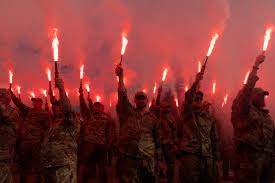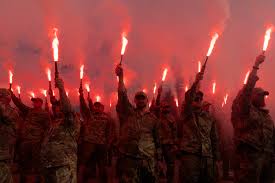Ukraine

Introduction
In a chilling development in the ongoing conflict between Ukraine and Russia, Ukraine has accused Russian forces of killing and dismembering a Ukrainian prisoner of war (POW). This accusation has sparked international outrage and deepened the already severe tensions between the two nations. The alleged incident, which underscores the brutal nature of the war, has drawn widespread condemnation and calls for accountability. The gruesome nature of the allegations has also intensified the focus on the treatment of POWs and the broader human rights implications of the conflict.
Background of the Conflict
The war between Ukraine and Russia began in February 2022 when Russian forces launched a full-scale invasion of Ukraine. The conflict has resulted in thousands of deaths, widespread destruction, and a humanitarian crisis that has displaced millions of people. Both sides have accused each other of committing atrocities, and reports of war crimes have been a persistent feature of the conflict.
The issue of prisoner treatment has been a particularly contentious aspect of the war. Both Ukrainian and Russian forces have captured soldiers from the opposing side, and there have been numerous reports of mistreatment and abuse of POWs. International humanitarian law, particularly the Geneva Conventions, mandates the humane treatment of prisoners of war, but these standards have often been ignored in the chaos and brutality of the ongoing conflict.
The Allegation
Ukraine’s accusation centers on a specific incident in which a captured Ukrainian soldier was allegedly killed and dismembered by Russian forces. According to Ukrainian officials, the soldier was captured during a recent military engagement and was subsequently tortured, executed, and dismembered. The Ukrainian government has released statements condemning the act as a heinous war crime and has vowed to seek justice for the victim.
Details about the incident remain limited, but Ukrainian authorities claim to have evidence supporting their allegations. This evidence reportedly includes intelligence reports, eyewitness testimonies, and potentially graphic images or videos. However, the full extent of the evidence has not been made public, and independent verification of the claims is difficult due to the ongoing conflict.
Table of Contents
International Reaction
The international community has reacted with horror to the allegations. Human rights organizations, governments, and international bodies have condemned the alleged killing and dismemberment as a flagrant violation of international law. The United Nations and the International Committee of the Red Cross (ICRC) have both expressed concern and called for a thorough investigation into the incident.
Western nations, which have been supporting Ukraine in its defense against the Russian invasion, have also condemned the alleged war crime. The United States, the European Union, and other NATO members have issued statements denouncing the act and reiterating their support for Ukraine. These nations have called on Russia to respect international law and the rights of prisoners of war.
Russia, for its part, has denied the allegations, dismissing them as propaganda and part of Ukraine’s broader information war. Russian officials have accused Ukraine of fabricating the story to garner international sympathy and to demonize Russian forces. They have also pointed to alleged Ukrainian atrocities as evidence that both sides are guilty of war crimes, attempting to deflect blame and create a narrative of moral equivalence.
Legal and Ethical Implications
The accusation of killing and dismembering a POW carries significant legal and ethical implications. Under the Geneva Conventions, which govern the treatment of prisoners of war, such acts are considered grave breaches and constitute war crimes. If proven, those responsible for the act could face prosecution in international courts, such as the International Criminal Court (ICC).
The incident also raises broader ethical questions about the conduct of the war and the treatment of individuals caught in the conflict. The deliberate killing and mutilation of a prisoner, if confirmed, would represent a severe violation of the principles of humanity and the rules of war. It would also contribute to the ongoing cycle of violence and retribution that has characterized the conflict, potentially leading to further atrocities.
The ethical implications extend beyond the immediate incident, reflecting on the conduct of both military forces and their leadership. Such acts, if condoned or ignored by higher command, suggest a breakdown in discipline and a culture of impunity that could have far-reaching consequences for the integrity of military operations and the protection of human rights in war zones.
The Role of Media and Information Warfare
The way this incident has been reported and disseminated highlights the role of media and information warfare in the conflict between Ukraine and Russia. Both sides have used information as a weapon, crafting narratives to gain international support and undermine the other. The media coverage of the alleged incident has been extensive, with news outlets around the world reporting on the accusations and the potential implications.
Potential Consequences and Next Steps
The accusation of killing and dismembering a POW could have significant consequences for the broader conflict. It is likely to deepen the animosity between Ukraine and Russia, hardening attitudes on both sides and potentially escalating the violence. For Ukraine, the incident could be used to rally further international support and to strengthen calls for increased military and humanitarian aid.
Conclusion
The accusation that Russian forces killed and dismembered a Ukrainian prisoner of war is a deeply troubling development in an already brutal and devastating conflict. If confirmed, it would represent a serious violation of international law and a horrific war crime. The incident has intensified the spotlight on the treatment of POWs and the broader human rights abuses occurring in the conflict.

As the world watches, the need for accountability and justice is paramount. International pressure on Russia to adhere to the laws of war and to respect human rights must continue, and those responsible for such heinous acts must be held accountable. In the midst of war, the protection of human dignity and the rule of law remain essential, and this incident serves as a stark reminder of the importance of these principles in times of conflict.







